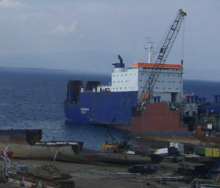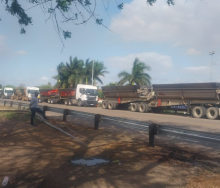There is no need for tighter legislation to hold truck owners accountable for accidents as it already exists although it is often not implemented, says Gavin Kelly, spokesman for the Road Freight Association.
Politicians and the public have been up in arms following the horrific accident in Pinetown earlier this month in which 23 people died when a truck ploughed through an intersection colliding with at least four minibus taxis.
As the driver of this vehicle faces 23 counts of murder and one of culpable homicide, politicians have called for more accountability for the owners of trucking companies while the public want to see trucks banned off certain roads.
“How can the driver of this truck be charged with murder? The act was not premeditated (at face value of the events in common circulation) so the driver should only be charged with culpable homicide by virtue of the fact that he was the driver,” said Kelly. “What needs to happen in this situation is for the accident investigation to ascertain what went wrong and not to apportion blame. Only thereafter can action be taken, and then to address the cause and not the symptoms.”
Kelly said the current accusations and sweeping statements being made about overloaded trucks and poor service maintenance were based on emotion and not fact.
“Where does overloading and poor maintenance come into this? In the case of the Pinetown accident no accident research on the incident has been done. There is only emotional and unfounded posturing.”
He said addressing truck accidents was not just about holding owners accountable or banning trucks off roads.
“There are serious gaps in the process around ensuring that compliance is maintained. That is the first challenge. Then there is a serious flaw in dealing with unroadworthy vehicles (not just trucks) and removing them off the road. That is the second challenge.
Finally there are challenges in accountability (at private and authority level). The legislation is there it is just not implemented.” He said at the same time the RFA had stated on numerous occasions over the past decade freight driver training should be given to the industry.
“Driver training is the domain of the Department of Transport and its provincial counterparts – and has been for the last 50 years. Drivers are not trained well enough – and that goes for all categories of drivers, not just freight, while the assessment of ability is exceptionally flawed.”
He said the calls for the banning of trucks from roads were best described as “shortsighted” by people who had no idea how this would impact their lives.
“Again, a very sweeping statement is being made regarding trucks avoiding toll roads and taking suburban roads. Sometimes trucks are on non-toll roads as they need to deliver goods. Toll roads are safer, shorter and far more freight friendly than other roads generally are. They also require (in most instances) less fuel for the equivalent distance to be travelled.”
Kelly said it was important to separate myth and urban legends from reality. In this regard, he said, the RFA had spent much time trying to change perceptions that trucks cause accidents and continued to do so.
Pinetown – time for cool heads
24 Sep 2013 - by Liesl Venter
0 Comments
Border Beat
10 Dec 2024
Featured Jobs
New
New












